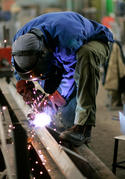Economics
Over the past year, Economic Modeling Specialists, Inc. (EMSI) has been fielding questions from local planners (workforce boards, community colleges, and economic developers) on how to look at green jobs, particularly at the regional level. Perhaps nothing has been more hyped, or misunderstood, than the potential impact of this sector on local economies.
In order to wade through the rhetoric and often overblown expectations, we’ve been doing our best to link labor market data to potential green sectors so people can gain an understanding of trends, earnings, education levels, and skills associated with “green occupation clusters”. So far, we have made three general observations: read more »
For the past decade a large coterie of pundits, prognosticators and their media camp followers have insisted that growth in America would be concentrated in places hip and cool, largely the bluish regions of the country.
Since the onset of the recession, which has hit many once-thriving Sun Belt hot spots, this chorus has grown bolder. The Wall Street Journal, for example, recently identified the "Next Youth-Magnet Cities" as drawn from the old "hip and cool" collection of yore: Seattle, Portland, Washington, New York and Austin, Texas. read more »
You would think, given the massive dissatisfaction with an economy that guarantees mega-bonuses for the rich and continued high unemployment, that the GOP would smell an opportunity. In my travels around the country — including in midstream places like suburban Kansas City and Kentucky — few, including Democrats, express any faith in the president’s basic economic strategy. read more »
Manufacturing employment has fallen below 12 million jobs for the first time since 1941, and manufacturing jobs as a percentage of total employment has fallen below 9%, the lowest level since the Bureau of Labor Statistics started collecting data in 1939. But annual manufacturing output per worker is also at a record high: $223,915 (in constant 2000 dollars). That's almost 3 times as much output per worker as in the early 1970s, and twice as much output per worker compared to the mid-1980s.
That has been the trend over the last 40 years: more output with fewer workers. That’s a good thing, or inevitable, or both – isn’t it? I used to think so; now I’m not so sure. read more »
By Richard Reep
“In hard times, people turn to God or alcohol” jokes Bud Johnson of Constructwire, a database that tracks planning and construction projects nationwide. Johnson, 50, is an industry veteran and has never seen a recession like this in his career. “This is an exceptionally broad-based downturn,” he says, “and Orlando has been hit harder than most in the South, what with your only real industries being housing and tourism.” Both industries have been trapped like mammoths in a glacier as the credit market stays stubbornly frozen in a modern banking Ice Age. read more »
With autocratic states like China and Russia looking poised for economic recovery, it's often hard to make the case for ideals such as democracy and rule of law. To some, like Martin Jacques, author of When China Rules, autocrats seem destined to rule the world economy. read more »
Public companies and their management boards are run with all the democratic coziness of banana republics. The object of the junta is to transfer the wealth of the shareholders into the bonuses and stock options of the management. As they used to say in China, “business is better than working.”
Amidst the outcry over excessive executive pay, it is worth noting that, in the caudillo management culture of many public corporations, there is nothing more annoying than a shareholder with an interest in the company that he or she partly owns. The most dreaded corporate day of the year is that of the annual meeting, when outside consultants are hired to screen bothersome questions and choreograph the happy gathering. read more »
To get a better idea why the Obama Administration’s efforts to stem the home foreclosure crisis have failed at both ends of the problem, you need only go back to that great scene in Frank Capra’s classic, “It’s A Wonderful Life,” where protagonist George Bailey (Jimmy Stewart) is on his way out of Bedford Falls with his new bride and high school crush, the former Meg Hatch (Donna Reed). The newlyweds are heading toward the train station to leave on their honeymoon when Meg notices a commotion outside the Bailey Bros. read more »
Beltway politicians and economists can argue themselves silly about the impact of the Obama administration's stimulus program, but outside the beltway the discussion is largely over. On the local level--particularly outside the heavily politicized big cities--the consensus seems to be that the stimulus has changed little--if anything.
Recently, I met with a couple of dozen mayors and city officials in Kentucky to discuss economic growth. The mayors spoke of their initiatives and ideas, yet hardly anyone mentioned the stimulus. read more »
A complex agriculture, along with urban culture, is one of the fundamental pillars of human civilization, and one of the fundamental bulkwarks of American prosperity. For families and communities involved in farming and ranching it’s also a way of life that is cherished, oftentimes passed on through generations, taking on reverential if not religious overtones.
At the same time in today’s overwhelmingly urban culture, cooking has become prime time entertainment, dining a social event, and what a person eats is increasingly associated with a healthy body and mind – sometimes a sort of spiritual well being. This elevates agriculture to an important issue even among those who have never spent a day on a farm. read more »
|





















